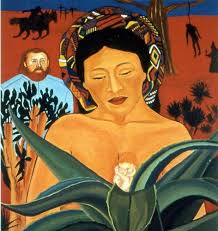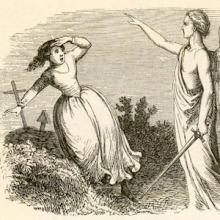Religion

Dona Marina, Cortes’ Translator: Painting, Santa Barraza
A representation of Malinche painted by a renowned Chicana visual artist and teacher from Texas. It depicts the beautiful, life-giving Malintzin, is a tiny image, crafted on metal, and meant to evoke ex-voto and other devotional images from Mexico.

Short Teaching Module: Children, Culture, and Folktales
For this particular lesson we examined two classic tales that while similar in many respects, highlight regional cultural differences especially in regard to childhood ideals.
President Reagan's "Evil Empire" Speech to the National Association of Evangelicals
Ronald Reagan began his presidency in 1981 confident that the policy of détente with the Soviet Union—initiated by Richard Nixon in May 1972 and terminated in January 1980 by Jimmy Carter as a response to the Soviet invasion of Afghanistan—was misguided.
Child Re-enacting Krishna Story
Krishna is known in the stories of the Bhagavata-Purana as the eighth incarnation, or avatar, of the god Vishnu. He is a very popular deity, a divine hero who personifies superhuman powers as well as human hopes and failings.
British Empire: Letter, Mary Moffat
Mary Moffat (1795-1871) was the wife of Robert Moffat, the missionary for the London Missionary Society who established a mission center at Kuruman in southern Africa. Their daughter married David Livingstone.
Sati: Letter, Francois Bernier
During the 17th century, Louis XIV of France sought to strengthen the power of the monarchy in France and to enhance France’s position in world politics. In 1664, Jean Colbert, his finance minister, established the French East India Company to develop French trade with India.
Early Modern Period: Autobiography, Glückel of Hameln
The following passages offer us a glimpse into the margins of early modern European society. Glückel of Hameln (1645-1724) was born into the Jewish community of Hamburg, a thriving German commercial center.
Early Modern Period: Autobiography, Bahina Bai
This selection comes from the autobiography of Bahina Bai (1628-1700), a Hindu poetess. Most of what we know about Bahina comes from her own writings, where she tells her life story.
Early Modern Period: Nonfiction, Jesuit Relations
This excerpt comes from a 1639 letter written by Mother Marie de Saint Joseph, a French Ursuline nun in Canada.
Cultural Contact in Southern Africa: Will, Laurens Verbrugge and Beletje Frederikszoon
Laurens Verbrugge and Beletje Frederikszoon were ordinary people from Holland who settled in Stellenbosch (near Cape Town) and took up farming there. Though not wealthy, they did own slaves and had sufficient property that they felt the need to draw up a will when Beletje became ill.